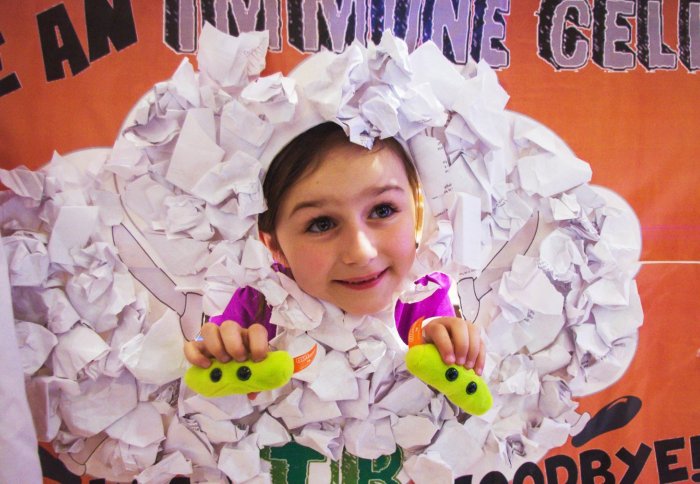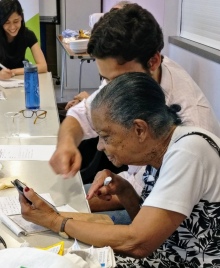Engagement seed fund brings Imperial research and education into the community

A young participant of the Translating TB exhibit
A play about making mistakes in the operating theatre is among the newly-funded engagement projects being carried out by Imperial staff this summer.
Four teams from across the College have become the first recipients of Imperial’s Societal Engagement Seed Fund – a new initiative helping staff and students engage the wider public with their research and education activities.
An inaugural fund of £10,000 was split between the winning projects in May this year. Each project met core criteria of the seed fund, namely to either innovate aspects of an existing societal engagement project, or pioneer a brand new project altogether.
Successful seed fund applicants were awarded by a selection panel chaired by Professor Maggie Dallman, Associate-Provost (Academic Partnerships). The panel reviewed all applications based on such markers as: the quality of the proposed engagement activities; the clarity of the audiences they aimed to target; the achievability of their aims; and the beneficial impact and legacy their project would have.
Introducing the winning projects
The Seed Fund recipients are now in the ‘delivery phase’ of their projects. Here is a roundup of the winning projects.
What the Tech? Digital Skills for the Elderly
 Who? The Business School has set up a digital skills programme for older residents at the Edward Woods community Centre in the Hammersmith and Fulham Borough, in collaboration with Helen Rowe of the Urban Partnerships Group and the local Community Champions.
Who? The Business School has set up a digital skills programme for older residents at the Edward Woods community Centre in the Hammersmith and Fulham Borough, in collaboration with Helen Rowe of the Urban Partnerships Group and the local Community Champions.
What? What the Tech? consists of weekly drop-in sessions, where older members of the local community can bring along any devices or online activities which they would like help and support with from the project’s student and staff volunteers.
They said: “The key driver for the programme is to help elderly residents with their technology needs and to reduce isolation.”
Making sense of our mistakes
About the project: This project aims to foster conversations about healthcare through theatre and story.
 Healthcare mistakes can be devastating for patients, families and the healthcare professionals involved. Conversations about them can be difficult. Sparking the conversation is a theatrical production, written by an NHS doctor and Imperial alumnus, about a young surgeon who makes a serious mistake in the operating theatre.
Healthcare mistakes can be devastating for patients, families and the healthcare professionals involved. Conversations about them can be difficult. Sparking the conversation is a theatrical production, written by an NHS doctor and Imperial alumnus, about a young surgeon who makes a serious mistake in the operating theatre.
The aims: The project, developed with members of the public, centres on engaging and involving patients, the public, healthcare professionals, academics and students to foster more meaningful conversations around mistakes.
They said: “We seek to explore how this kind of engagement contributes to these conversations and to the understanding of those involved.”
Public involvement in proposal development
About the project: This project focuses on the health impacts of large transportation infrastructure initiatives (Crossrail and High Speed Rail 2 (HS2).
 The aim: The project aims to develop and test out a public engagement strategy for including perspectives from members of the public in research design. The team is developing a protocol on how to do this, based on the experience of two grant applications to assess the health impacts of large transport infrastructure projects (HS2 and Crossrail). Ultimately this project hopes to lead to better research proposals with stronger impact potential.
The aim: The project aims to develop and test out a public engagement strategy for including perspectives from members of the public in research design. The team is developing a protocol on how to do this, based on the experience of two grant applications to assess the health impacts of large transport infrastructure projects (HS2 and Crossrail). Ultimately this project hopes to lead to better research proposals with stronger impact potential.
What's happened so far? The team has conducted two engagement sessions at Imperial, and two in the Royal Borough of Greenwich - an area of London which is relevant to Crossrail. The team has received excellent feedback and insights which they will integrate in their proposal. In September, they will conduct engagement sessions in Camden and Islington.
They said: “To be useful and effective in bringing about change, applied research needs to address societal needs. What better way to do this then to ask members of the public – at the very early stages of research development to tell us what they believe we should be assessing in our research?”
Translating TB
About the project: This project using multilingual, cross-cultural approaches to adapt latent tuberculosis awareness material for high-burden London communities.
The project harnesses the linguistic skillsets of local London communities and academic institutions (by directly engaging refugees and students) to translate a latent tuberculosis (LTBI) awareness animation developed into the most common languages spoken among London communities eligible for LTBI testing and treatment.
What will happen next? The translated animations will be screened at events in Bromley by Bow and White City, to which the team will invite members of target community groups, supporting healthcare providers, and third sector organisations. The team’s researchers and academic and refugee translation volunteers will also be present.
They said: “We hope these interactive screening events will help to break the boundaries between the different TB stakeholders in London and establish lines of communication with otherwise hard-to-reach populations.”
Engaging with the community
Professor Dallman said: “Congratulations to all the recipients of the very first Societal Engagement Seed Fund at Imperial. We had an excellent response from the College community during the application process. The four winners had sharply defined proposals which closely met the criteria of the fund, and we are delighted with the progress the teams have been making since the disbursement of the awards.
“Engaging with the communities we belong to is a central part of Imperial’s mission. This new annual fund, and the projects which are now being carried out as a result of it, are great examples of this vision being practiced with positive and measurable outcomes for all involved.”
The recipients of the fund are expected to complete their projects by December this year, at which time they will write up full reports on the success and learning outcomes of their activities.
Applications for the next round of the Seed Fund will open in autumn this year. Information on how to apply will be posted on the Societal Engagement Seed Fund page soon.
Article text (excluding photos or graphics) © Imperial College London.
Photos and graphics subject to third party copyright used with permission or © Imperial College London.
Reporter
Andrew Youngson
Communications Division